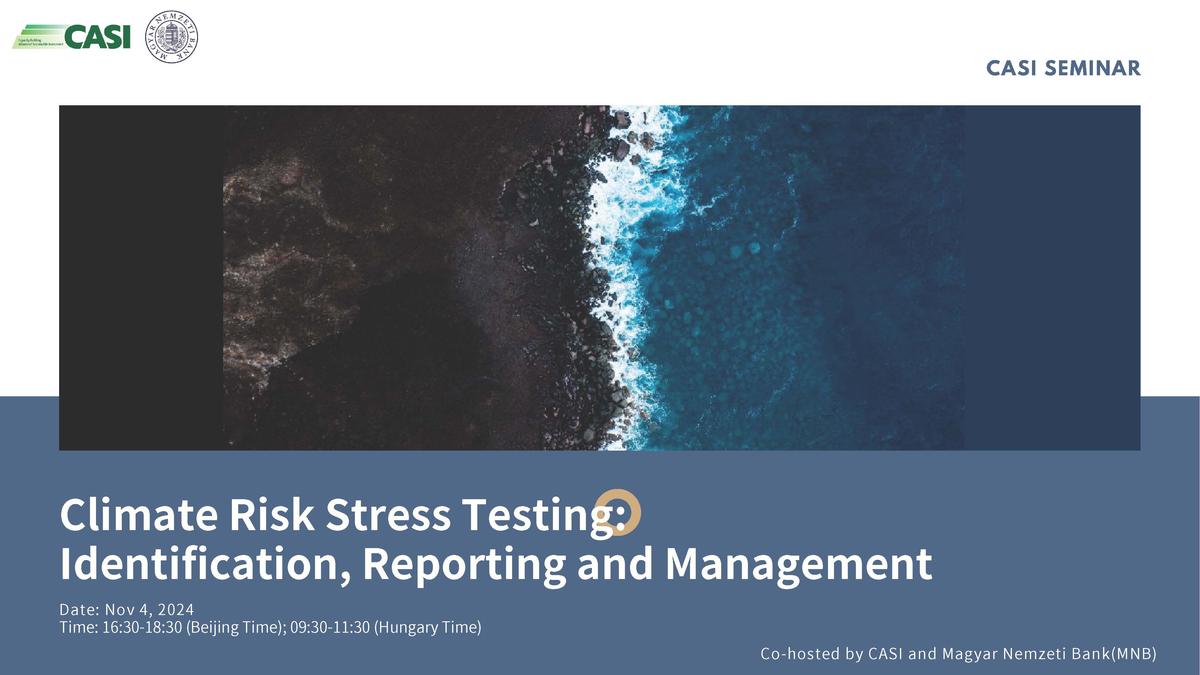
On November 4th, the Capacity-building Alliance of Sustainable Investment (CASI), in partnership with the Central Bank of Hungary (MNB), hosted a seminar on "Climate Risk Stress Testing: Identification, Reporting, and Management," attracting over 90 registrants from the financial sector.
This event brought together a panel of experts from central banks, financial institutions, and academia to delve into the evolving landscape of climate stress testing. The discussion focused on the latest methodologies for assessing climate risks, the critical role of central banks and regulators in shaping stress testing practices, and the far-reaching implications of sustainability disclosure requirements for financial institutions and other stakeholders.

Moderators and Speakers of the event
During opening remarks, Dr. Ma Jun, Chairman of CASI and President of IFS, reflected on CASI’s growth from 42 to 60 members since its launch at COP28. He emphasized the critical financing gap for sustainable investments, particularly in developing countries, and the need for capacity-building in policy standards, financial products, and risk management tools. Dr. Ma also underscored the importance of integrating climate risk analysis into global sustainability reporting standards, calling for simplified, standardized tools to reduce compliance costs and ensure meaningful, comparable results.
Dr. Csaba Kandrács, Deputy Governor of the MNB, delivered a keynote speech and addressed the growing intersection of climate change and financial stability. He highlighted Hungary’s proactive approach, including green recommendations to enhance risk management for banks and insurers. Stress testing, he noted, is a crucial tool for simulating potential climate impacts on financial institutions, and he urged for continued improvements in regulatory frameworks to incorporate these tools effectively.
At the panel discussion moderated by Ms. Marion Amiot, Head of Climate Economics and European Economist of S&P Global Ratings, experts from central banks and financial institutions shared valuable insights into the methodologies and practices surrounding climate stress testing from both regulatory and institutional perspectives.
- Bálint Várgedő, the quantitative analyst from MNB, discussed the evolution of climate stress testing at the Bank, focusing on the transition from long-term macro-economic assessments to short-term, actionable scenarios for individual banks. He emphasized the importance of NGFS scenarios and the upcoming integration of climate stress tests into supervisory frameworks by 2025.
- Dickson Ng, Manager of Market and Liquidity Risk Division of Banking Supervision Department of HKMA, shared insights from the HKMA’s climate stress testing exercises, noting improvements in data collection and the importance of sustainability disclosures in enhancing risk management practices across the industry. He also mentioned that the practices can help integrate climate risks into governance frameworks, fostering collaboration across the industry and ultimately enhancing financial system resilience to climate challenges.
- Bao Ying, Division Director of Risk Management Department of ICBC, outlined ICBC's integrated approach to climate risk management, aligning it with credit, market, and liquidity risks. The bank uses tools like risk identification, climate rating, monitoring, and TCFD-based reporting. Stress testing helps assess long-term climate risks and trends in high-emission industries. ICBC localizes NGFS scenarios, employing a bottom-up approach to evaluate customer impacts, guiding credit approvals and risk provisioning. This integration supports long-term planning and ICBC's commitment to sustainable finance.
- Gábor Szigel, OTP Bank’s Senior Internal Advisor, highlighted the complexities of climate stress testing, particularly uncertainties in long-term projections. He commented on the NGFS scenarios for economic growth assumptions and the implications for stress tests. Szigel also shared insights on sectoral models, pointing out that the mining industry lacked correlation with financial risk. He also said it would not be necessary to turn stress tests into a broad compliance exercise, advocating for balanced approaches that acknowledge modeling limitations and transition risks, which are not new to the banking sector but require careful regulatory application.
The event was wrapped up by Cheng Lin, Head of CASI Secretariat, who highlighted the role of stress testing, especially for larger financial institutions dealing with regulation and disclosure requirements. He also introduced a few upcoming events, including a sustainable finance forum in Baku during COP 29 and a webinar on transition financing investments in December. He looked forward to future collaborations and ongoing dialogue with the HKMA and the MNB on sustainable financing and investment initiatives.


